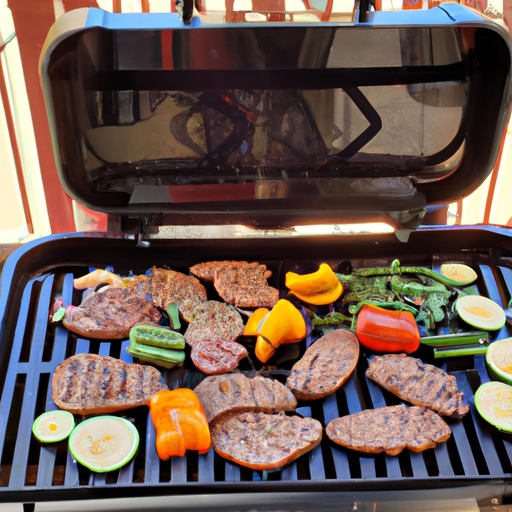So you’ve just moved into a new apartment with a lovely balcony, and you can’t help but envision all the summer evenings you’ll spend grilling up delicious meals with friends and family. But wait, before you fire up that grill, it’s essential to consider the rules and regulations around balcony grilling. After all, no one wants to end up with a hefty fine or, even worse, cause a safety hazard. This article will guide you through the dos and don’ts of using a grill on a balcony, ensuring you can enjoy your culinary adventures without any worries.
Can You Use A Grill On A Balcony?
Safety Precautions to Consider
Grilling on a balcony can be a great way to enjoy delicious meals while taking advantage of outdoor living spaces. However, it is important to consider safety precautions to ensure that you can grill on your balcony without any risks.
First and foremost, it is crucial to have a fire extinguisher nearby. Accidents can happen, and having a fire extinguisher readily available can help you quickly and effectively put out any flames that might occur.
Another important safety precaution is to never leave the grill unattended. Grilling can quickly become a fire hazard, and it is essential to keep a close eye on the grill at all times. This means that you should avoid leaving the balcony while the grill is in use, and make sure to turn it off properly when you are finished cooking.
It is also essential to keep flammable objects away from the grill. Make sure that there are no plants, wooden furniture, or other flammable items near the grill or within the range of its heat. Keeping a safe distance between the grill and any potential fire hazards will significantly reduce the risk of accidents.
Lastly, it is crucial to keep children and pets away from the grill while it is in use. A balcony can be a tempting place for young ones and four-legged friends to explore, but it is important to create a safe environment by keeping them away from the grill.
Types of Grills Suitable for Balconies
When considering grills for your balcony, it is important to choose one that is suitable for the space you have available. There are several types of grills that are commonly used on balconies, each with its own advantages and considerations.
Electric grills are often a popular choice for balconies. These grills are powered by electricity and do not require the use of propane or charcoal. Electric grills are generally considered safe for use on balconies since they do not produce open flames or harmful fumes. Additionally, they are relatively compact and easy to use, making them suitable for smaller balcony spaces.
Another option for balcony grilling is a gas grill. Gas grills use propane or natural gas for fuel and provide a convenient and efficient way to cook. When using a gas grill on a balcony, it is crucial to ensure proper ventilation to prevent the accumulation of fumes.
Charcoal grills, while providing a delicious smoky flavor, may not be the best option for balconies due to the potential for open flames and the release of potentially harmful fumes. However, if you are determined to use a charcoal grill on your balcony, make sure to follow all safety precautions, including ensuring proper ventilation and keeping flammable objects away.
Checking Local Regulations
Before firing up the grill on your balcony, it is essential to check local regulations and guidelines regarding grilling. Some localities have specific rules and restrictions regarding grilling on balconies, including limitations on the type of grill allowed, the distance between the grill and other structures, and even outright bans on grilling in certain areas or buildings.
To avoid any potential legal issues or fines, it is recommended to contact your local authorities or consult the building management to inquire about any specific restrictions or guidelines for grilling on your balcony. By doing so, you can ensure that you are in compliance with local regulations and enjoy your balcony grilling experience without any concerns.
Ensuring Proper Ventilation
When using a grill on a balcony, proper ventilation is crucial to prevent the accumulation of fumes and promote fresh air circulation. Insufficient ventilation can lead to the buildup of harmful carbon monoxide and other combustion byproducts, posing a serious risk to your health and safety.
To ensure proper ventilation, make sure to position your grill in an area where there is adequate airflow. This can be achieved by keeping the grill away from any walls or obstructions that may block the airflow. Additionally, consider opening windows or doors nearby to allow fresh air to circulate while grilling.
It is also important to note that using the grill indoors, such as in an enclosed balcony, is extremely dangerous and should be strictly avoided. The lack of proper ventilation in an enclosed space can lead to the rapid accumulation of dangerous fumes, creating a potentially life-threatening situation.
Considering Fire Hazards
Grilling on a balcony inherently comes with fire hazards that need to be carefully addressed. The proximity of a grill to flammable materials, such as wooden balcony railings or outdoor furniture, can significantly increase the risk of fires.
To minimize fire hazards, maintain a safe distance between the grill and any flammable objects. This means positioning the grill away from wooden railings, walls, and furniture. It is also recommended to use flame-resistant materials for any balcony decor or furniture to further reduce the risk of fires.
Additionally, never leave the grill unattended and ensure that you have a fire extinguisher readily available in case of emergencies. Being proactive and taking necessary precautions will go a long way in ensuring a safe grilling experience on your balcony.
Using a Grill Mat or Pad
To protect the surface of your balcony and minimize the risk of accidental fires or damage, consider using a grill mat or pad underneath your grill. A grill mat or pad is a heat-resistant and easy-to-clean barrier that can be placed underneath the grill to provide an extra layer of protection.
Grill mats or pads are typically made from materials such as fiberglass, silicone, or PVC, and are designed to withstand high temperatures and prevent grease or other substances from seeping through to the balcony surface. They can also help in absorbing any accidental spills or grease, making it easier to clean up after your grilling session.
Using a grill mat or pad is a simple yet effective way to protect your balcony from heat damage and potential stains, ensuring that your grilling activities do not cause any lasting harm to the surface below.
Assessing Structural Capacity
Before setting up a grill on your balcony, it is essential to assess the structural capacity of the balcony itself. Balconies are designed for various uses, but not all of them may have been engineered to support the weight and heat generated by a grill.
Check with a qualified professional, such as a structural engineer or building inspector, to ensure that your balcony can safely accommodate the weight of a grill and any additional factors that come with it, such as propane tanks or cooking accessories. This step is crucial to avoid any structural damage or safety hazards that may arise from overloading the balcony.
Consulting with the Landlord or Building Management
If you are renting or living in a building with multiple units, it is important to consult with your landlord or building management before using a grill on your balcony. They may have specific rules or guidelines regarding grilling on balconies that need to be followed.
Engaging in open communication with your landlord or building management not only ensures that you are abiding by the rules but also helps create a harmonious living environment for all residents. They may also provide additional insights or suggestions for safe grilling practices on balconies within the building.
Alternatives to Traditional Grills
If you are unable to use a traditional grill on your balcony due to safety considerations or local regulations, there are several alternative options available that can still allow you to enjoy the flavors of outdoor cooking.
Electric tabletop grills are compact, easy to use, and produce minimal smoke, making them a viable option for balcony grilling. They are often designed for indoor use as well, making them a versatile choice that can be used in various settings.
Additionally, portable grills, such as small charcoal or gas grills, might be permitted on some balconies, as they are specifically designed for outdoor use and can be easily moved and stored when not in use.
Hibachi grills are another alternative to consider. These traditional Japanese grills are compact and can be used outdoors. They often use charcoal as fuel, so it is important to follow safety precautions, especially regarding ventilation and proximity to flammable objects.
Tips for Safe Grilling on a Balcony
To ensure a safe and enjoyable grilling experience on your balcony, here are some additional tips to keep in mind:
-
Read the grill’s instruction manual thoroughly and familiarize yourself with the proper usage and safety guidelines specific to your chosen grill.
-
Clean your grill regularly to remove any excess grease or food particles that may pose a fire risk.
-
Avoid grilling on windy days to prevent the flames from being easily blown around and potentially causing accidental fires.
-
Keep a safe distance between the grill and any combustible materials, such as plants, curtains, or furniture.
-
Use long-handled utensils to minimize the risk of burns and keep a heat-resistant glove or mitt nearby for added protection.
-
Before starting the grill, check the propane tank for leaks or damage, and ensure that all connections are secure for gas grills.
-
Never use a grill indoors or in an enclosed space, as this can lead to the accumulation of dangerous fumes.
-
Be considerate of your neighbors and avoid excessive smoke or odors that could disrupt their enjoyment of their balconies or living spaces.
By following these safety tips and guidelines, you can enjoy the pleasures of grilling on your balcony while ensuring the well-being and safety of yourself and those around you. Happy grilling!

